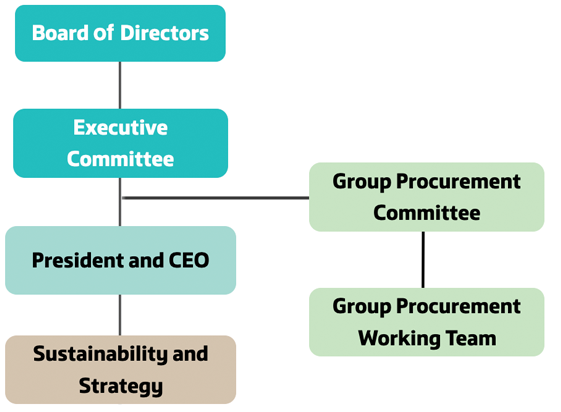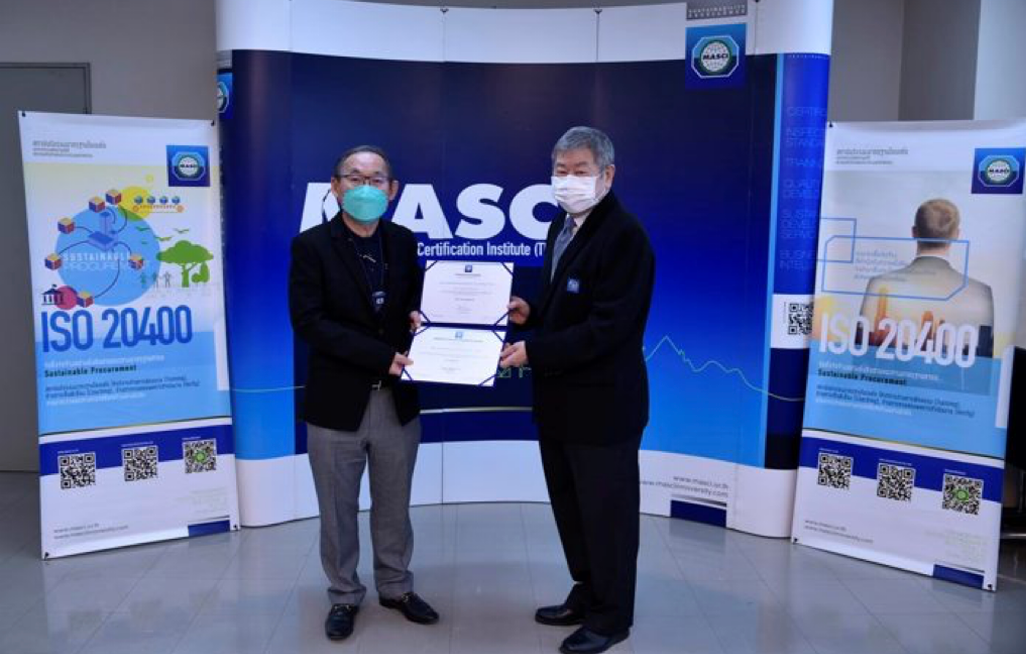

SUSTAINABLE SUPPLY CHAIN
Management Governance

ThaiBev’s Sustainable Supply Chain Management Structure

| Role | Responsibilities | Meeting Frequency |
| Board of Director (BoD) |
|
Quarterly basis |
| Group Procurement Committee (GPC) |
|
Quarterly basis |
| President and CEO |
|
Quarterly basis |
| Group Procurement Working Team |
|
Monthly basis |

| Applicable Policies & Guidelines | Environmental |
Social |
Governance |
|||
| Environmental Guideline | GMO Guideline | Sustainable Agriculture Guideline | Packaging Guideline | Human Rights Policy | Supplier Code of Practice | |
| Direct Material | ||||||
| Packaging | ||||||
| Agricultural Commodity | ||||||
| Petrochemical | ||||||
| Chemical | ||||||
| Indirect Material | ||||||
| Construction | ||||||
| Spare Part | ||||||
| Office & Factory Supply | ||||||
| Machinery | ||||||
| Marketing Material | ||||||
| IT & OA Equipment | ||||||
| Material Handling | ||||||
| Service | ||||||
| Target achieved | In procress |
| Sustainability Commitments | 2021 | 2022 | 2023 | 2024 | Target | Target Year |
Compliant Supplier
Number of active suppliers complying with ThaiBev Supplier Code of Practice |
100% | 100% | 100% | 100% | 100% | 2024 |
Local Procurement
Number of suppliers whom ThaiBev procures goods and services from operating in Thailand |
97% | 96% | 96% | 97% | 95% | 2024 |
ESG Risk Assessment
Number of active suppliers undergo sustainability risk assessment |
100% | 100% | 100% | 100% | 100% | 2024 |
Critical Supplier Audited
Number of critical tier 1 and non-tier 1 suppliers being assessed on site by third-party or ThaiBev auditors |
100% | 100% | 100% | 100% | 100% | 2024 |
Responsible Sourcing
Volume of key agricultural raw materials responsibly sourced i.e. malt and hops, sugar, broken rice, tea leaves, and palm oil. |
100% | 100% | 100% | 100% | 100% | 2025 |
Third-party Risk Assessment
Number of active suppliers being assessed and examined on sustainability risks by a third party or using third-party risk database |
100% | 100% | 100% | 100% | 100% | 2025 |
Strategic Suppliers Having Supplier Code of Conduct Implemented
Number of strategic suppliers having their own supplier code of conduct implemented to their tier 1 suppliers (ThaiBev’s non-tier 1 suppliers) |
56% | 75% | 83% | 88% | 100% | 2030 |
| Management Level | Type of Incentive | Incentivized KPIs | Details |
| Executives Officers | Monetary | Sustainable supply chain | ThaiBev sets Corporate KPIs that reflect our CEO, executive, and employee compensation. ThaiBev’s Corporate KPIs relating to Sustainable supply chain. We define and categorize the criteria for achieving Corporate KPIs into 5-level. Compensation and bonuses will be allocated to relevant executives and employees, with related targets to 100% of strategic suppliers to have their own supplier code of conduct implemented by 2030. |
| Business Unit Managers | Monetary | Sustainable supply chain | ThaiBev sets Corporate KPIs that reflect our CEO, executive, and employee compensation. ThaiBev’s Corporate KPIs relating to Sustainable supply chain. We define and categorize the criteria for achieving Corporate KPIs into 5-level. Compensation and bonuses will be allocated to relevant executives and employees, with related targets to 100% of strategic suppliers to have their own supplier code of conduct implemented by 2030. |
NEW SUPPLIERS |
EXISTING SUPPLIERS |
||||
1
Registration
|
2
Pre-qualification
|
3
Bidding & Award
|
4
Evaluation
Annual supplier performance review
|
5
Capacity Building
|
6
Collaboration
|

